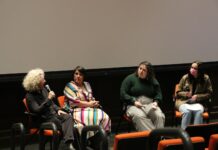Author: Rachel Silver
His lecture, “Fast Food Nation Revisited: The Link between Food Justice, Worker Justice, and Immigrant Justice,” connected changes in food justice in the last decade and addressed problems in the food system in Los Angeles County. The food movement, a social reaction based on concerns for the environment, health and local economy, has become more mainstream since “Fast Food Nation” was published in 2001. Since then, Schlosser has written about nuclear weapons and is extending his Atlantic Monthly article “The Prison-Industrial Complex” into a full-length book. His work on the 2008 documentary “Food, Inc.” broadened his audience and gave him a platform for speaking about worker exploitation and rights. Occidental College commended his wide scope in investigative journalism on prevalent social issues with an honorary degree.
Schlosser is frequently compared to the great muckraker Upton Sinclair, whose early twentieth century novel “The Jungle” revealed the plight of immigrant meatpackers. Schlosser identifies with Sinclair’s underlying frustration with the public’s unexpected reaction. He quoted Sinclair, “I aimed at the public’s heart, and by accident, I hit it in the stomach.” Instead of resulting in increased rights for the immigrant workers, “The Jungle” resulted in better food regulations. To Schlosser, “Fast Food Nation” has perpetuated a trend of health-awareness and natural-or-organic food among the well-educated, but it has not improved food access or working conditions for the working class. Poor and immigrant workers continue to struggle in the fields, behind counters and in factories. “The pride I feel in this book and its success is tempered. The bittersweet feeling I have is about the people who have been left behind,” Schlosser said.
The phenomenon of fast food emerged in Southern California when businessman Ray Kroc purchased the McDonald brothers’ company in 1961. Los Angeles developed as a city of the automobile and the associated ideals of speed, efficiency and technology, which intersected with the rise of fast food. Schlosser connected the history of fast food development and the decline of worker justice, as the worker became dispensable in a mechanical system of unskilled work. Kroc wanted conformists. He said, “The organization cannot trust the individual; the individual must trust the organization.” With McDonalds, he strove for the greatest uniformity, conformity and cheapness. Schlosser phrased it as “everything, everywhere, always the same.”
Commenting on the economics of modern fast food, Schlosser said that the fast food industry is the largest employer of minimum wage workers and are also the greatest opponent to increases in the minimum wage. In 1998, McDonald’s Corporation shut down a restaurant in Quebec when employees began forming a union. As employers of a significant number of Americans, fast food companies are as critical in the worker justice debate as they were when “Fast Food Nation” was first published and continue to fight against workers’ rights.
Though in elementary school when his first book was published, Anna Dalton, a senior UEP major, described Schlosser’s visit as “a huge deal.” She said, “I also think it was important that he is now focusing on issues of workers’ rights because they are the ones often left out of the discourse of the food movement.” Dalton’s interest reflects an increased awareness of food and worker justice on the Occidental campus manifesting in several organizations. Popular clubs including F.E.A.S.T., Well-Fed, Veg Heads, and the residential Food Justice House have made initiatives towards change. Thirty students actively rallied last month against Trader Joe’s farmworker exploitation, and at the beginning of November, the food-stamp challenge tested the will and ability of students to eat on $4.5
0 a day, the amount paid out by the federal Supplemental Nutritional Assistance Program (SNAP).
In the academic sector of food justice, Gottlieb teaches “Food and the Environment,” a UEP course with a major research component. Schlosser met with the class in the Morrison Lounge on Thursday. Sitting in a circle of chairs, they introduced themselves and discussed the students’ research topics. Areas of research include the effect of food advertising on children, food carts in Los Angeles, and urban “food deserts,” areas in the industrialized world where it is difficult to find affordable, healthy food. Impoverished areas tend to have more convenience and liquor stores than grocery stores, creating more challenges for the working class to budget and feed their families healthy food.
Occidental students are increasingly aware of food justice in a society dependent on a complex, often imbalanced food industry. Schlosser, too, is looking forward. The Occidental honorary degree recipient said, “I hope one of the things that come out of this food movement is a concern for more than food, and a concern from the heart, and a compassion for the people at the bottom of this society.”
Past recipients of honorary degrees from Occidental College include Father Gregory Boyle, executive director of Homeboy industries and advocate for at-risk youth; David Brooks, New York Times columnist; and Janette Sadik-Khan, New York City Transportation Commissioner.
This article has been archived, for more requests please contact us via the support system.
![]()






































